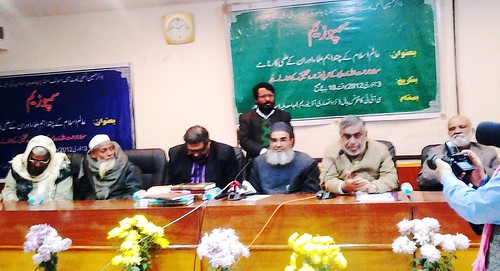By Manzar Imam,
New Delhi: There is need to counter the phantom of Islamophobia being so widely propagated. People are turning to Islam with a speed like never before. These views were expressed by Maulana Saeedur Rahman Azmi, rector Darul Uloom Nadwatul Ulama, Lucknow. He was chairing a symposium organized by Zakir Hussain Institute of Islamic Studies, Jamia Millia Islamia (JMI) at the University’s CIT Conference Hall on 3 January.
Titled “Some Important Ulama of the Muslim World and their Academic Contributions” the symposium was dedicated to research, editing and translation done in Arabic by Maulana Muhammad Rahmatullah Nadwi. Everyone wants life to be beautiful, worth emulating, said the Nadwa rector adding that the young scholar had shown the way to make life both beautiful and worthwhile.

L-R: M Shahid Husaini, M Qasim Muzaffarpuri, Suhail Warraich, Saeedur Rahman Azmi, Prof. Akhtarul Wasey & Tariq Mahmood Shaam
Azmi took strong exceptions to the general tendency of demanding to make Islam moderate saying that Islam has always been moderate and will remain so. Prof. Akhtarul Wasey, Head, Department of Islamic Studies, said that Quran is the word of Allah and Fitrat (Nature/Moderation) is His practice. And, “there can be no contradiction between Allah’s word and action”. Porf. Wasey, who is also the Vice-Chairman of Urdu Academy, Delhi said that the responsibility of bridging the distance between religion and world lay with ulama, intellectuals and those endowed with knowledge.
He called the works of the young scholar immensely valuable. He stressed the need to focus on fundamental teachings of religion rather than standing divided on sectarian lines.
Special guest in the symposium were two senior Pakistani journalists Tariq Mahmood Shaam and Suhail Warraich. Speaking on this occasion, Shaam, Head of Editorial Board of Pakistan’s ARY Network, said, although he came from an Islamic Republican country but Islam, Urdu and democracy were better practiced in India than in Pakistan. He said that Muslim rulers were fonder of constructing castles, monuments than promoting academic work.
While appreciating the work of Maulana Rahmatullah, Shaam emphasized that ulama must direct their attention to militant Islam, radical Islam, political Islam and such other new terminologies that have gained currency after 9/11. The young scholar’s works need to be introduced in Pakistan, added the veteran journalist.
Famous GEO TV presenter Suhail Warraich raised three major questions; a) what should be the system of governance for Pakistan or any other Muslim country? b) Interest is prohibited in Islam. In that case then what is the alternate economic system for Muslims? c) If faced with any problem, what is the way out for Muslims – jihad, negotiation or something else? Warraich, who is also national editor of the political cell of Pakistan’s leading Urdu Daily Jung said that there was need to pay attention to these questions.
Ulama made great contributions from 13 to 18th century, said Dr. S. M Azizuddin Husain, Dean, Faculty of Humanities and Languages, JMI, adding that those days were very difficult for academic work. He made special mention of Mughal ruler Akbar saying that Akbar had set a system of research and academic work and provided scholarships for it. He said that linguistic bias should be avoided and drew the attention of ulama to relook their madrasa syllabus. The architect of Taj Mahal was product of a madrasa, said he.
It is the duty of ulama to spread knowledge and education as they are described as heirs of the prophets, said Maulana Mohammad Shahid Al-Husaini of Madrasa Mazahir Uloom, Saharanpur. He further said that prophets did not leave heritage of wealth, property and power. Their heritage is knowledge and education, he said.
Maulana Shahid said that books hold great value and that many misconceptions are automatically removed when good books are written. While the works of Maulana Rahmatullah show his great individual academic excellence, it is also a matter of pride and honour for Indians as he does all these work in a foreign land.
Rahmatullah Nadwi expressed his sense of gratitude to his teachers whose role he called “important” in charting his life and career. He urged madrasa graduates to muster courage for academic work. New opportunities will open up automatically, said he.
Abdul Qadir Shams Qasmi, senior sub-editor of Urdu weekly Aalami Sahara, who coordinated the programme, presented a brief introduction of the author, translator, Rahmatullah Nadwi. Dr. Mohammad Ajmal Qasmi, a post doctoral research fellow at Jawaharlal Nehru University; Waris Mazhari, editor of Tarjuman-e-Darul Uloom, Safdar Zubair Nadwi, Mohammad Mushtak Tujarawi and Abdullah Mubarak Nadwi presented essays and analyses highlighting different aspects of the works of Rahmatullah Nadwi, the centre of the symposium’s theme. The message of Maulana Khalid Saifullah Rahmani, head of Al-Ma’had al-Aali al-Islami, Hyderabad, who could not attend the programme was read out by Mufti Imtiyaz Ahmad Qasmi. It appreciated the work of Nadwi.
(Manzar Imam is a postgraduate student at the Nelson Mandela Centre for Peace and Conflict Resolution, Jamia Millia Islamia, New Delhi. He can be reached at [email protected] or +91-9810035066)
